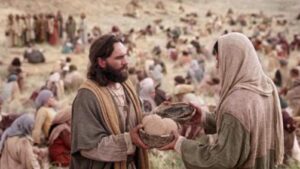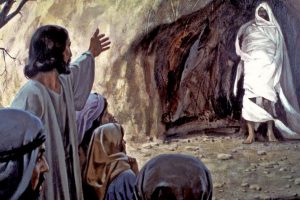 This is one of several of Jesus’ clear “end of time” reminders. “The coming of the Kingdom of God cannot be observed, and no one will announce, ‘Look, here it is, or there it is.’ Don’t worry about tomorrow, for tomorrow will worry about itself. Each day has enough trouble of its own.” In this Gospel we have a warning and a promise. “This is your chance to tell the Good News. Do not worry about what to say for I will give you wise words. None of your enemies will be able to prove that you are wrong. They will not be able to say that your words are false.” These words of Jesus, quoted by Luke, remind me that when I am in a situation I can depend on Jesus’ promise: “I myself will give you wisdom, wise words, in speaking.”
This is one of several of Jesus’ clear “end of time” reminders. “The coming of the Kingdom of God cannot be observed, and no one will announce, ‘Look, here it is, or there it is.’ Don’t worry about tomorrow, for tomorrow will worry about itself. Each day has enough trouble of its own.” In this Gospel we have a warning and a promise. “This is your chance to tell the Good News. Do not worry about what to say for I will give you wise words. None of your enemies will be able to prove that you are wrong. They will not be able to say that your words are false.” These words of Jesus, quoted by Luke, remind me that when I am in a situation I can depend on Jesus’ promise: “I myself will give you wisdom, wise words, in speaking.”
Occasionally I find amusement by reading horoscope predictions at the end of the day. It’s amusing to see if yours played out during the day that’s ending. A few months back, my Scorpio sign read like a fortune cookie: “Worry is like a rocking chair: it gives you something to do but gets you nowhere.” Some days that “rocking chair” could work ruts in the carpet!
What kinds of things do we stew about? Here’s the top-of-the-list items that researchers tell describes the typical worry patterns.
+ 40% of our worries are things that will never happen
That’s a huge chunk that we can let go of that otherwise might keep us awake at night.
+ 30% of our worries are about the past
…which can’t be changed anyway so why not dump the gunny sack!
+ 12% are about criticism by others, mostly untrue – and many imaginary
So why do we so often assume that other people are going to spend their precious time thinking about “me”?
+ 10% are about health, which only gets worse with stress
Wouldn’t it be more helpful to use some relaxation techniques? Find ways to loosen up and let our bodies work their own magic on the knots?
+ Only 8% are about real problems that CAN be solved
This is where we need to spend our energy and focus our prayer. At the same time, be carefully aware to play “hands off” with trying to offer God the only right solution. Our limited eyesight most likely will only see a rather self-serving solution. “God-sight” knows the key to the best fix for all concerned.
It’s a good time to draw on the sentiments of the Serenity Prayer: God grant me the serenity to accept the things I cannot change, courage to change the things I can, (here’s the key sentence) and the wisdom to know the difference.
Keep in mind that worry and fretting leave wiggle room to come between me and God. Lying just below the surface may be the view that God has somehow lost control of the situation and we’ve lost trust in God’s omnipotent care for us. A legitimate concern should draw us closer to God and cause us to rely on divine providential love for us.
By our Corporate Commitment we profess “to respond to the needs of the people of God with the compassion of Christ.” But how can we do that if we have not learned to depend on the compassion of Christ? Saying the words is one thing; living with a firm conviction that compassion begets compassion is altogether another matter. Let us live by the motto: Words move; example motivates.” It is our lives, not our words, that make us credible. We pray, O God, may our lives, individually and collectively, be an example that motives all who meet us to be people of compassion.
~by Sister Roberta Bailey, OSB
Pray for our bishops who will be meeting in Washington D.C. November 14-17. May they each be open, and responsive to, the voice of the Spirit. May they travel in safety and peace.
First Reading Malachi 8:19-20a
Second Reading 2 Thessalonians 3:7-12
Gospel Reading Luke 21: 5-19
Continue Reading





 the Samaritan’s concrete, personal actions teach us that compassion is not a vague feeling – it means to take care of the other even to paying in person.) It means to commit oneself, taking all the necessary steps to ‘come close’ to the other, to the point of identifying oneself with him: “you shall love your neighbor as yourself.”
the Samaritan’s concrete, personal actions teach us that compassion is not a vague feeling – it means to take care of the other even to paying in person.) It means to commit oneself, taking all the necessary steps to ‘come close’ to the other, to the point of identifying oneself with him: “you shall love your neighbor as yourself.”

